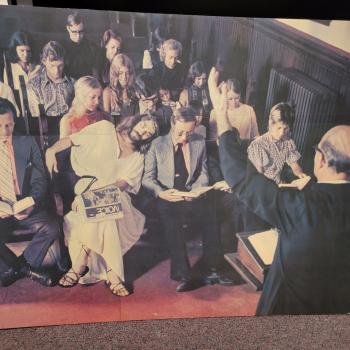Just as the belief that there is only one God was central to early Judaism, so for Paul the reformulation of what that belief meant is central to Pauline theology, and Wright is prepared to explain why. When the major symbolic praxis of the Jewish worldview (circumcision, food laws,sabbath-keeping) had been deemed ‘adiaphora’…then theology and particularly monotheism needed to take on far more of the load in sustaining the worldview in its radically new form.” (p. 625). The key to understanding second temple monotheism is not a particular proposal about the inner nature of the one God (p. 626– here Wright is largely in agreement with Bauckham). It had nothing to do with debates about thrones or exalted angels. It had never been part of the Jewish second temple worldview that God was the only non-human intelligence in the universe. “The main focus of Jewish monotheism in our period then looked not…inward towards the analysis of the one God, but decidedly outward to the relation of the one God to the world.” (p. 627).
“Monotheism therefore meant foundationally and scripturally the renunciation of ontological dualism. Renouncing the world itself, pretending it was a dark and gloomy place, complaining about the soul being imprisoned within a material body, or grumbling at the very existence of human rulers and power structures was not part of this worldview.” (p. 628). There was God, and there was everything else which the one God had created. This is what creational monotheism amounted to— a fundamental denial of dualism when it comes to all that exists. And furthermore, it involved a celebration of the essential goodness of all that exists.
Thus, “when Jews prayed the Shema twice or more each day, they knew they were opposed, in heart and mind and with the breath of life, to idols to the making and worshipping of them, to the way of life that went with them and– not least– to the actual human beings and actual human systems whose lives revolve around ‘the gods of the nations’ their temples and their worship” (p. 630). Thus this is an exclusive kind of monotheism, not the kind that we find in the Letter of Aristeas 16 where one hears that the God Jews worship as Yahweh, you Greeks call Zeus etc. For Jews, a rose by any other name was in fact not a rose. And as the story plays out in the Bible, there is only universalism through the vehicle of particularism– the world shall only be set right through faith in the one Biblical God, and not otherwise. There is no endorsement here of modern pluralism. God will come and establish his own singular Kingdom on earth, to which all must give allegiance, or else find themselves left out. And once more with feeling “In second-Temple monotheism, the fact that there was one God, utterly supreme,the only creator and governor of all, did not rule out the possibility of their inhabitants of the heavenly realm, but actually tended to entail that possibility.” (p. 632). These supernatural beings just weren’t gods. They were good creatures gone wrong, just like fallen humans and a fallen world. Nor did belief in the absolutely goodness of God and originally of all his creation entail some sort of moral and material dualism like one finds in Gnostics. Evil is simply a cancer in and on the good. Not an independent deity, entity, reality.
Wright affirms Bauckham’s label– eschatological monotheism. YHWH will be one and his name one, in the end, when he establishes his rule on earth fully (p. 633). Then every knee will bow and every tongue confess (as Isaiah says), whether willingly or unwillingly, whether wittingly or unwittingly. Wright argues that early Christology was not a reconfiguration of early Jewish beliefs about angelic mediators or the like. It was a radical concretization of pre-Christian of pre-Christian Jewish beliefs about the one God, and particularly about what that one God had promised to do.” (p. 633).


















